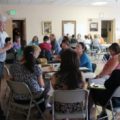
This post was written by Gretchen Hammer, a previous member of our team.
This week we celebrate the signing of the Declaration of Independence. It is a day when the nation stops to celebrate our democracy and the courageous notion that “every day, ordinary people” are willing and able to create our civic infrastructure and govern ourselves.
I think about the involvement of “every day, ordinary people” in our health care transformation work a lot, because I believe health care is one of the key civic infrastructures for any healthy and productive community. According to the latest available data, 1.7 million Coloradans, a full one-third of our state’s population, say the health care system is not meeting the needs of their family. 1.7 million people! For those of us who consider ourselves leaders in health care, this is a harsh reality that we have a responsibility to work to address.
And work we are. This summer, my weeks are filled with meetings focused on transforming our health care system, ranging from stakeholder groups working on the State Innovation Models Grant to efforts on payment reform, access to care, and workforce development. And, staff at CCMU continues to be heavily involved in improving Medicaid through the Accountable Care Collaboratives and preparing for the expansion of Medicaid in 2014.
But if we are being really honest, the voice of “every day, ordinary people” is missing from nearly all these conversations.
A recent column chronicling twenty years of school reform in Colorado by Denver Post columnist Vincent Carroll crystallized it for me:
"But the real revolution ushered in by charters--and by the other great advance of that era, open enrollment within and across districts--has to do with parental expectations. Coloradans now expect choice. They expect to shop around for the right school for their children, to compare programs and even outcomes."
Eureka! Perhaps the real revolution in health care will come from a shift in patient and community expectations.
Today, many of the metrics of success we are contemplating are all about the system itself--shifting the proportion of care that is delivered through a specific model, lowering system costs, changing utilization patterns, and more.
What if we took a lesson from the education reform movement and focused on shifts in patient and community expectations as our core metric of success? What if we held ourselves accountable to metrics around the expectations of patients and communities to be able to shop for the right care setting for their needs, compare health care systems and even health outcomes? Revolutions are characterized by the replacement of one worldview with another; it could be that changing what we as patients expect from our health care system is the new worldview we need to launch our revolution.
CCMU has not perfected authentic engagement of patients and communities in our work, but as I have written before, it is powerful when our work is informed by those we aim to serve. It could be even more powerful if their experiences did not just inform our work, but provided a swelling tide demanding change and urging forward progress. If we strengthen the involvement of patients and communities and allow ourselves to expect more from our health care system, we will fulfill the promise of our great democracy.




